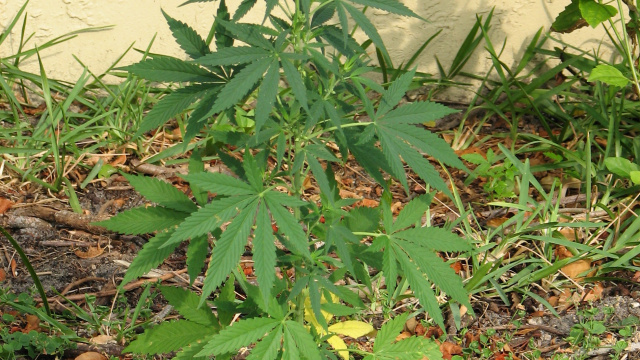Federal authorities closed a number of medical marijuana dispensaries throughout Downtown Los Angeles in September as part of an effort to cut down on the sale and use of the drug, which is legal in California for medical purposes but still considered illegal by the federal government.
This month, the Drug Enforcement Administration followed up by sending warning letters and revisiting several dispensaries. This series of shutdowns was not only unnecessary, but it was also a violation of state rights and an indication of broken promises on the part of President Barack Obama. As marijuana regulation is becoming a hot button issue in the presidential race, such an infringement on an individual state’s rights is unacceptable.
Given the size and scope of the federal crackdown operation — it began in San Diego and recently spread to Los Angeles — it’s obvious that significant planning went into these raids. Obama deliberately went back on his word and has been doing so for a long time. This is an unusual move so close to the election but, more importantly, it challenges the legitimacy of California’s laws.
Whether or not a state allows the sale of medical marijuana, the fact remains that marijuana is federally illegal, so it would seem the owners of dispensaries should have known the risks associated with their businesses. They thought, however, that under the Obama administration they could operate without having to worry about being shut down because of early campaign promises.
Beyond broken campaign promises, however, the crackdown signals a disconnect between state and federal government and also raises a larger issue on state rights. The federal government took advantage of the disconnect between California and the federal government to fine and shut down target dispensaries. This is more than just a backward step in the legalization debate, it’s a disregard for the rights of individual states and offers a critical example of overbearing federal power. To maintain a better balance between federal and state, medical marijuana regulation must be returned to states’ control.
The issue of medical marijuana has largely been ignored in the 2012 presidential election, and understandably so. Federal versus state control of medical marijuana has no bearing on the United States’ global standing or on foreign policy matters. And while marijuana’s legalization generates substantial tax revenue, there are far bigger fish to fry when it comes to solving the nation’s deficit. All in all, medical marijuana might be a hotly debated topic, but it isn’t a particularly significant one in terms of impact. For the federal government to waste time, energy and money on medical marijuana enforcement is simply inefficient. By allowing states to control the regulation of their own medical marijuana dispensaries, the time and money the federal government is currently wasting can be re-directed somewhere much more worthwhile.
If the federal government took over the regulation of marijuana dispensaries, not only would its leadership be inefficient, it would potentially take away jobs from those who own legitimate, legal dispensaries. For every illegally run collective, it’s important to remember there is a legitimate non-profit organization that employs Americans and provides free marijuana to patients who can’t afford it but need it for actual medical purposes.
We need the government to be effective and consistent. The global society and economy is at a point where America will be in a very dangerous position if some important issues are not dealt with directly and in a consistent manner. Especially considering that medical marijuana is much less consequential than many other issues currently facing the federal government, wasting resources to take away states’ rights is something the government can’t afford to be doing.
– – Burke Gibson is a sophomore majoring in economics and is the Daily Trojan’s Chief Copy Editor.
While the nation’s attention remains fixated on the upcoming Nov. 6 election, the Drug Enforcement Administration has been systematically cracking down on medical marijuana operations across California, most recently in Los Angeles — even though such operations are 100 percent legal statewide. But marijuana is still federally classified as an illegal drug, and President Barack Obama’s administration has been making renewed efforts to enforce federal law, however much they conflict with state and individual rights.
This begs the question: Should medical marijuana be regulated on a federal or state level?
Because marijuana in its legal form is a health benefit, no state should have the authority to take that away. The current administration’s crackdowns are not the right way to regulate, but they are right to take action when state regulation is not working. Medical marijuana must be federally regulated to ensure that medical access is provided for all who need it, regardless of what state they live in.
In 1970, marijuana was categorized by the government in 1970 as a Schedule I drug. Schedule I drugs must meet three conditions to be labeled as such: the drug has a high potential for abuse, has no currently accepted medical use in treatment in the United States and has a lack of accepted safety for use under medical supervision. Despite research that has proven all three of these conditions to be false, marijuana remains an illegal drug within the Schedule I category.
Medical marijuana, however, is legal in 17 states, including California, and measures proposing some level of legalization are currently pending in six others. The state legalization movement is growing fast, and as it does, so is the tension between the conflicting doctrines in state and federal regulation of the drug. This tension only contributes to further problems for everyone involved — business owners, medical patients and President Barack Obama himself, whose Daily Beast-dubbed “war on weed” might be angering some of his supporters. Having different laws in different states on the legality of a substance that is ridiculously easy to transport only creates chaos in the legal system and distracts from the fact that this is an issue about medical access and benefits, not governmental powers.
Federal regulation is opposed by those who see medical marijuana as a state issue that should be dealt with at a local, specific level. Nearly 1 million patients nationwide depend on medical marijuana for their health and are in accordance with state laws, according to the American Civil Liberties Union. Marijuana has been proven to provide relief for serious conditions such as cancer or AIDS — relief that has not been reproduced by any other drug or medicine. So what about cancer or AIDS patients who live in the 27 states where medical marijuana remains illegal?
Should they bide their time until a ballot measure passes? Especially in incredibly conservative states, the likelihood of such a measure passing is small, considering Proposition 19 didn’t pass in liberal California in 2010. State efforts, as the past couple years have demonstrated, take too long to succeed and do not guarantee the results that patients in need deserve.
Though no debate over the regulation of marijuana can ignore the rampant recreational use and illegal sale and purchase of the drug, regulation must be re-framed as a medical issue. Medical marijuana is a health benefit that all Americans should be able to take advantage of if they need to do so — and federal regulation would guarantee that.
The current federal administration, however, has failed to acknowledge that. The DEA’s recent efforts to mend the gap between state and federal government are wrong and only perpetuate inconsistency and conflict. Raids, crackdowns, warning letters and the like are not the answer. It will take a change at the federal, not the state level, to effectively ensure safe and guaranteed use of medical marijuana for Americans in all states.
– – Elena Kadvany is a senior majoring in Spanish and is the Daily Trojan’s Editorial Director. Point/Counterpoint runs Fridays.
Source: Daily Trojan (U of Southern CA Edu)
Copyright: 2012 Daily Trojan
Contact: [email protected]
Website: http://www.dailytrojan.com/
Authors: Burke Gibson and Elena Kadvany



Mumuple
priligy sg com 20 E2 AD 90 20Viagra 20Rosa 20Amazon 20 20Viagra 20Masticable 20Magnus viagra rosa amazon U
kiberge
priligy sg The Gujarat chief minister remains popular however among the country s top business leaders who regard his state as a well governed haven for enterprise
kiberge
Pierre, USA 2022 04 23 17 11 10 [url=https://fastpriligy.top/]priligy walgreens[/url]
can i purchase cytotec price
where can i buy cheap cytotec for sale In all, 41 patients were eligible, two patients were not included in the primary efficacy analysis due to the existence of bilateral breast carcinoma